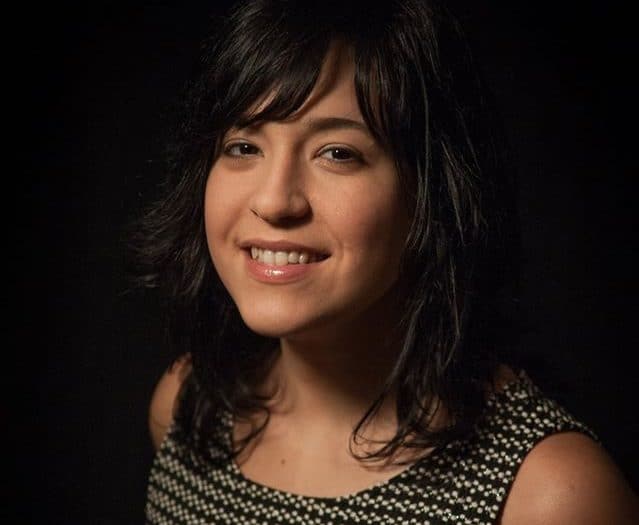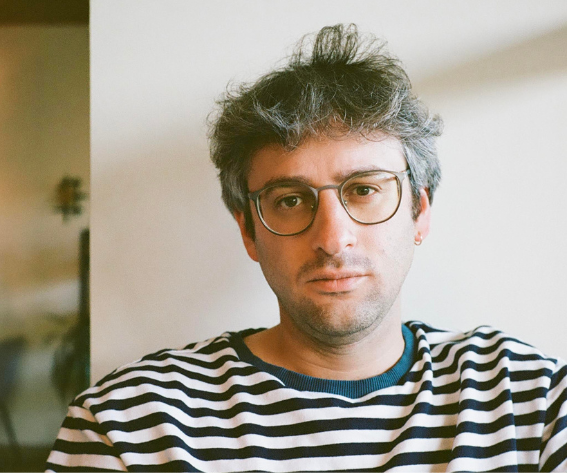Summer is gone, the gloomy allure of autumn is in full swing, and with it come the dark clouds and the dead leaves. But we’ve got the perfect cure against all the gloominess unfolding outside: ‘The Return of the Train‘ (Le Retour du Train) won our Film of the Month award for September 2017. We had a short talk with the film’s director, Sara Grimaldi.
JL: Congratulations for winning TMFF’s Film of the Month award, Sara! How did you take the news of your success?
Sara: I have of course been very happy about this award, but I think that it’s the result of the hard work of the cast and crew of the film, so I decided to immediately share the news with them.
JL: You have directed and written ‘Le Retour du Train’, and for the latter job you’ve also won our Screenwriter of the Month award for September. What inspired you to write the screenplay?
Sara: I wrote the first draft of the script during a filmmaking masterclass I attended in Russia. It was a strange period of my life, where I wasn’t really satisfied of my job activity, but I didn’t know what to do to improve it. Suddenly I had the inspiration of this story and during one class of the masterclass I wrote the entire script. Of course, after that it was rewritten several times. And then during this experience abroad I also took the train from St Petersburg to Moscow and traveling in the third class was quite an adventure that made me think a lot about the trains and what they have meant to people’s life.
JL: Your film paints a wonderful metaphoric representation of progress versus complacency, and the associated absurdities relating to this. How did you come about to choose the train as a symbol?
Sara: The advent of the train was a big change in human life. Suddenly people could easily move from one place to another and this meant new interactions and more changes in the daily life. That’s why I chose the train as a symbol. It’s the symbol of the opportunities and future that are awaiting for us and to which we need to move forward. But in the middle of the story there is also another character: a small and unused train station. This train station is the location of earthy exchanges. This is where the village people express their beliefs and their awareness of a change that is already underway.
JL: One can identify a specific temporal setting of the plot. How significant is this, if at all, in the overall meaning of the film’s message?
Sara: Although there is a temporal setting in the plot, it’s not a central element. I wanted the story to be a universal and timeless metaphor. It could be set anywhere and in any time, the only important thing, it’s its message. Anyway, the closure of the rail stations is an event that actually happened throughout France after the WWII and it affected the life and economy of those areas. Many towns started to be more and more isolated, transports became complicated and people started to move to bigger cities. So in some ways, what I told in this film is not far from what really happened in the sixties.
JL: Is waiting for a train than may never come (symbolically, of course) still preferable than having no expectations whatsoever?
Sara: ‘Le retour du trainʼ is a metaphor of the unexpected opportunities and events that we encounter in our everyday lives. A train we are waiting for, which may or may not arrive or a train that we might or might not expect to take. Will the wish to change our lives be strong enough to put us in motion? To me it’s preferable to try a path, although we might not be sure of where it will take us, than not moving at all. So yes, I would prefer to wait for a train that may never come, because wonderful things could happen while waiting. It’s always worth to try.
JL: Where did the shooting of the film take place?
Sara: The film was shot in the Vexin, a region at 40 km from Paris.
JL: What was, in your opinion, the most difficult aspect in the production process of ‘Le Retour du Train’?
Sara: I think the most difficult thing was that the budget was quite small and the story was still very complicated. We had scenes including many actors and that was the most difficult part to organize. But I had a great crew working with me and in the end everything went well.
JL: What other film projects have you been involved in?
Sara: I have already shot other short movies, selected in festivals, and also documentaries. A documentary of a while ago, but still travelling in festivals, was shot in an italian prison and it’s about women inmates and their relationship with nature. That has been a project that left a mark on me and one of the best films I had the chance to work on.
JL: What do you feel was the most important lesson that you learned while filming ‘Le Retour du Train’ – a takeaway that you’ll seek to apply in your next project?
Sara: I think that the most important lesson I learned is that making a complex film, like ‘Le Retour du Train’, takes time and I really need to learn to be patient. It took me 4 years to make it, in the end it’s not a long time and I must say we had 100 people working on it, so it was really a big organisation. But if it would have been for me I would have wanted to make it in 1 year. So, yes, I really need to learn to be patient and wait. Things in the end go well, if you work hard and don’t stop believing in your dreams.
JL: What have you got planned for the near future? Any new projects that you’ve started or have in the planning phase?
Sara: I’m currently working on a documentary I will start shooting next year. It’s on immunodeficiency diseases and I will co-direct it with my husband Matteo Pellegrinuzzi (DP on Le retour du train). I’m also working on my first feature film, a story set between France and Italy, and on a web-series, co-directing it with Monica Ross (Editor on Le retour du train).
JL: How can we stay up to date with any updates regarding ‘Le Retour du Train’, or any other potential projects from you?
Sara: You can follow our fb page where we regularly publish updates on the film https://www.facebook.com/
JL – Thank you so much for your time, Sara, and our sincerest congratulations once again! We wish you all the best in your future endeavours, and hope to enjoy your work again soon!









Leave a reply